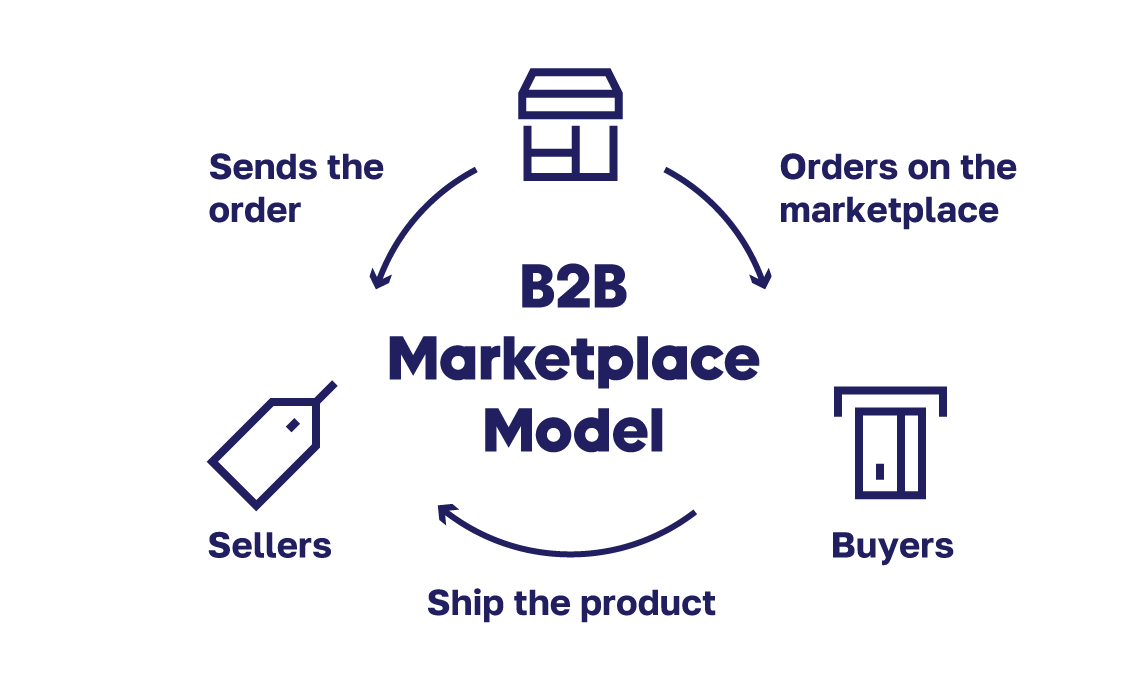The Biggest B2B Marketplaces: Top 7 Successful Players

What is a B2B marketplace?
The global B2B ecommerce industry was worth US$20.4 trillion in 2022, and according to Statista, that was over five times the size of B2C ecommerce. These numbers make one thing clear: the future of ecommerce, at least in the near future, is B2B.
But what exactly is driving this growth?
At the core of this shift are B2B marketplaces — also known as B2B e-marketplaces or B2B platforms — which serve as digital environments where businesses buy and sell products and services with one another. Unlike B2C marketplaces that cater to individual consumers, B2B platforms are built to handle high-volume, high-value transactions between companies.
These platforms streamline procurement processes by allowing B2B buyers to compare suppliers, negotiate bulk pricing, and manage large-scale purchases in one place. Meanwhile, sellers and service providers benefit from expanded reach, access to international buyers, and tools that support long-term customer relationships.
Typical offerings range from raw materials and industrial equipment to office supplies, wholesale goods, and even specialized services like logistics or manufacturing support.
Whether you’re a retailer sourcing inventory or a manufacturer scaling globally, top B2B marketplaces offer a faster, more efficient path to global trade.

Vertical vs. horizontal B2B marketplaces
B2B marketplaces generally fall into two categories: vertical and horizontal. Understanding the difference can help businesses choose the right platform for their needs.
What is a vertical B2B marketplace?
A vertical B2B marketplace focuses on a specific industry or product category. These platforms are tailored to meet the unique needs of a particular sector; whether that’s fashion, electronics, foodservice, or healthcare.
Pros:
- Highly targeted buyer and seller matching
- Industry-specific features and services
- Easier discovery of relevant products
Cons:
- Limited reach beyond the core industry
- May not suit businesses with broader needs
What is a horizontal B2B marketplace?
A horizontal B2B marketplace serves a wide range of industries and product categories. These platforms offer everything from electronics to office supplies to manufacturing components — all under one digital roof.
Platforms like Alibaba and Amazon Business are classic examples. Their strength lies in their scale, offering vast product selections and connecting millions of global buyers and sellers across multiple sectors.
Pros:
- Huge product variety
- Broader buyer and seller base
- Ideal for businesses with diverse procurement needs
Cons:
- Less industry-specific customization
- Can be harder to filter for niche products
Is Amazon a B2B marketplace?
For B2B transactions, Amazon operates Amazon Business, a dedicated platform that meets the procurement needs of companies of all sizes. It offers features like business-only pricing, quantity discounts, bulk shipping options, and multi-user account access. With tools for approval workflows and spend analytics, Amazon Business helps organizations streamline their purchasing while leveraging the trusted infrastructure of one of the world’s largest marketplaces.
Is Shopify a B2B marketplace?
While Shopify isn’t a B2B marketplace, it remains a powerful ecommerce platform for businesses that want to build and control their own branded B2B storefront. It supports advanced features such as custom pricing, account-based logins, and flexible order workflows. However, unlike marketplaces that offer a built-in customer base, Shopify requires sellers to drive their own traffic — making it ideal for brands with established audiences or targeted growth strategies.
7 global B2B marketplaces to know in 2025
As businesses look for more efficient ways to manage transactions and expand their reach, B2B e-marketplaces have become a vital solution. What is a B2B e-marketplace example? Platforms like Amazon Business, Alibaba, and Rakuten are prime examples, offering digital spaces where companies can easily connect with suppliers, streamline their operations, and scale more effectively.
Amazon Business
Ideal for: Large organizations, SMBs, institutions
Amazon Business brings the familiar ease of Amazon into the world of business-to-business commerce. It’s built for scale, offering flexible procurement features, multi-user accounts, and deep catalog access — all in a secure and familiar environment.
Key features:
- Business Prime shipping with same-day and bulk delivery options
- Workflow approvals and spend visibility
- Exclusive business pricing and quantity discounts
- Multi-user accounts and tax-exempt purchasing
Key benefits:
- Simplifies B2B procurement with automation and transparency
- Supports cost control with centralized buying and analytics
- Trusted fulfillment and customer service infrastructure
How it supports B2B growth: Ideal for companies managing complex purchases, Amazon Business helps streamline buying processes, reduce costs, and empower teams to make faster, more informed purchasing decisions.
Alibaba
Ideal for: Sourcing from manufacturers, global trade
Alibaba is the world’s largest B2B ecommerce marketplace, connecting millions of buyers and suppliers across borders. It’s a go-to platform for businesses looking to source goods directly from manufacturers at competitive prices.
Key features:
- Massive global supplier network
- Trade assurance for safe transactions
- Custom product sourcing and RFQs (Request for Quotations)
- Flexible payment options (Alipay, bank transfer, escrow)
Key benefits:
- Access to low-cost, high-volume inventory
- Direct relationships with suppliers, no middlemen
- Supports private-label, OEM, and bulk purchasing
How it supports B2B growth: Alibaba helps businesses scale by lowering sourcing costs and opening the door to international trade — whether you’re importing, exporting, or developing private-label products.
Global Sources
Ideal for: Verified suppliers, Asia-focused sourcing
Global Sources is a trusted online B2B marketplace and media platform that connects buyers with pre-vetted suppliers, especially across Asia. Known for its trade shows and quality control, it’s a reliable space for serious procurement.
Key features:
- Verified supplier system backed by third-party audits
- Trade show integration and supplier capability assessments
- Product comparison tools and intuitive search
Key benefits:
- Reduced risk with reliable, verified suppliers
- Strong anti-counterfeit safeguards
- Efficient supplier discovery and vetting tools
How it supports B2B growth: By focusing on trust, quality, and transparency, Global Sources gives buyers peace of mind when sourcing from Asia — making it ideal for companies expanding their global B2B operations.
IndiaMART
Ideal for: Domestic and international B2B buyers in India
IndiaMART is the largest online B2B marketplace platform in India, serving millions of buyers and suppliers across industries. It’s a powerful tool for discovering suppliers, comparing prices, and managing secure transactions.
Key features:
- Two-way discovery through direct messaging and inquiries
- IndiaMART Payment Protection for secure transactions
- Wide product range across 60+ categories
Key benefits:
- Huge domestic reach and supplier base
- Easy onboarding for sellers
- Trusted by Indian SMBs and global buyers alike
How it supports B2B growth: IndiaMART empowers local and global businesses to tap into India’s booming commerce sector, making it a top choice for buyers seeking competitive pricing and broad category access.
Rakuten
Ideal for: Established brands and niche B2B sellers in Japan and beyond
Rakuten is one of Japan’s most prominent ecommerce platforms, often referred to as the “Amazon of Japan.” While known for B2C, Rakuten’s ecosystem includes a robust online B2B marketplace that supports business sellers with curated storefronts, strong brand control, and marketing support.
Key features:
- Personalized brand storefronts
- Custom product pages with rich media
- Email marketing tools (R-Mail) for direct customer engagement
- Dedicated ecommerce consultants for sellers
Key benefits:
- Focuses on seller empowerment, not competition
- Encourages long-term buyer-seller relationships
- Strong local reach and growing international presence
How it supports B2B growth: Rakuten enables brands to differentiate themselves, build trust, and scale in Japan’s mature digital market, making it a strategic entry point for B2B companies targeting the region.
Unite (formerly Mercateo)
Ideal for: Enterprise procurement, mid-market B2B, and public sector buyers in Europe
Unite is one of the best B2B marketplaces for network and procurement across Europe. Formerly known as Mercateo, Unite allows buyers and sellers to connect via a centralized platform that emphasizes compliance, transparency, and supplier relationship management.
Key features:
- Centralized procurement with pre-approved suppliers
- Integration with ERP systems
- Digital invoicing and approval workflows
- Support for public procurement standards
Key benefits:
- Reduces procurement friction with structured workflows
- Increases trust and transparency between buyers and suppliers
- Designed for scalable, repeatable transactions in regulated sectors
How it supports B2B growth: Unite simplifies large-scale purchasing for enterprise and institutional buyers — particularly in highly structured and compliance-driven environments.
Walmart Marketplace
Ideal for: Large-scale product distribution and multi-category sellers
While often seen as a retail powerhouse, Walmart Marketplace is increasingly becoming a B2B channel for manufacturers and wholesale sellers. With its massive infrastructure and customer reach, Walmart offers B2B sellers the ability to scale quickly and efficiently.
Key features:
- Integration with Walmart’s logistics and fulfillment services
- Category-level merchandising support
- API access and bulk upload tools for product data
- Pricing and inventory management controls
Key benefits:
- Access to one of the largest retail ecosystems
- Enhanced brand visibility and trust
- Fulfillment options that reduce operational overhead
How it supports B2B growth: Walmart’s hybrid approach offers sellers the ability to reach both B2B and B2C buyers, positioning it as a powerful multi-channel growth partner.
Benefits of B2B marketplace selling
Joining a B2B marketplace platform can unlock major advantages for businesses looking to grow, scale, or streamline their operations. These digital platforms do more than just connect buyers and sellers — they open up strategic opportunities for visibility, efficiency, and sales growth.
Access to valuable sales channels
B2B marketplaces offer built-in buyer networks, helping sellers tap into high-intent B2B buyers without the need for extensive outbound marketing.
Expanded market share and reach
Whether you’re targeting local or international buyers, marketplaces enable you to reach new regions, industries, and customer segments more easily.
Optimized B2B transactions and procurement
From streamlined procurement processes to digital tools for invoicing, order management, and customer support, B2B platforms simplify day-to-day operations.
Lower cost of customer acquisition
By leveraging the platform’s existing traffic and exposure, sellers can reduce marketing costs and generate leads at a lower cost than traditional sales methods.
Built-in digital platform features
Many marketplaces come with value-added features like shipping logistics, tax automation, analytics dashboards, and promotional tools — all designed to support business growth.
Opportunities for competitive pricing and exposure
With transparent pricing and product comparisons, sellers can stay competitive while gaining exposure through search visibility, filters, and featured listings.
In short, selling on a B2B marketplace can position your business for scalable, efficient growth — especially in today’s fast-moving digital economy.
How to succeed with B2B ecommerce marketplaces
Launching a B2B operation on a marketplace is a major opportunity, but it requires a smart setup to scale effectively. To stay competitive, businesses must streamline operations, maintain accurate product data, and meet evolving buyer expectations.
Here are three key best practices to help you succeed across B2B marketplaces.
Use real-time inventory management tools
In B2B commerce, selling products that are out of stock can quickly erode buyer trust. Real-time inventory systems help you keep track of available stock across multiple channels — preventing overselling and backorders.
For companies managing both B2C and B2B inventory, separating these streams and syncing them properly is crucial. Integrating your marketplace with an ERP system can ensure inventory accuracy and reduce manual errors. Analytics dashboards also provide insights across all sales channels, helping you track performance and identify opportunities for optimization.
Streamline your order fulfillment process
Fulfilling B2B orders isn’t the same as direct-to-consumer shipping. These orders are larger, more complex, and often require bulk handling, custom labeling, or scheduled deliveries.
To scale effectively, consider partnering with third-party logistics providers or leveraging the built-in fulfillment services offered by some marketplaces. This helps you reduce delivery times, meet buyer expectations, and free up internal resources to focus on growth.
Implement a Product Information Management (PIM) system
B2B buyers expect detailed, accurate, and consistent product information — especially when purchasing at scale. Managing this across multiple platforms can be a challenge, particularly if you’re working with a large number of SKUs.
A Product Information Management (PIM) system centralizes and synchronizes product content, including:
- SKUs, titles, and descriptions
- Product images, tags, and categories
- Tiered pricing and minimum order quantities
By keeping all data aligned across your storefront and wholesale marketplaces, you ensure B2B buyers always receive accurate information — no matter where they place their order.
How Centric PXM helps B2B sellers succeed across marketplaces
Success in B2B ecommerce isn’t just about listing products; it’s about delivering accurate, enriched, and channel-ready product information at every stage of the buyer journey. As the complexity of B2B selling grows, businesses need a system that supports scalable product data management, cross-channel consistency, and operational efficiency.
That’s where Centric PXM™ makes a difference.
As a leading Product Experience Management (PXM) solution, Centric PXM enables B2B sellers to centralize, enrich, and distribute product content seamlessly across online B2B platforms.
Here’s how Centric PXM sets B2B sellers up for success:
Centralized product data
Manage all your product details — SKUs, descriptions, specifications, digital assets, certifications, pricing structures, and more — from a single source of truth. This ensures consistency across every sales channel and removes the risk of outdated or conflicting information.
Complex product hierarchies made simple
B2B commerce often involves configurable products, bundles, accessories, and variants. Centric PXM supports advanced product relationships, allowing you to model complex structures and give buyers a clear view of what’s available.
Faster time to market
Push updates and new products to multiple B2B platforms simultaneously. Centric PXM enables fast and accurate content syndication, accelerating your product’s visibility and reducing time-to-sale across regions and channels.
Marketplace-ready, enriched content
Every marketplace has different content requirements. Centric PXM automatically adapts your product data to meet the formatting, localization, and channel-specific standards required for each platform; no manual re-entry needed.
Multichannel publishing
Whether you’re selling through ecommerce sites, mobile apps, AR experiences, or wholesale portals, Centric PXM ensures the right data is delivered to the right channel — enhancing the buyer experience while maintaining brand consistency.
Built-in governance and collaboration
Empower your teams with role-based access control and customizable workflows. From product managers and marketers to compliance officers and sales teams, everyone can work together efficiently while maintaining full control over data access and approvals.
Pricing and contract flexibility
B2B buyers often require customized pricing, contractual terms, and tiered discounts. Centric PXM supports dynamic pricing models and personalized offers — allowing you to deliver tailored experiences to every buyer.
Scalability and tech integration
Whether managing hundreds or thousands of SKUs, Centric PXM scales with your business. It integrates easily with your ERP, ecommerce platforms, and third-party tools — creating a connected ecosystem that supports your long-term growth.
Analytics and performance insights
Make smarter decisions with real-time dashboards and reporting. Centric PXM provides visibility into product performance, data quality, and publishing workflows — so you can fine-tune your strategy and respond quickly to market demands.
For B2B sellers aiming to scale across digital marketplaces, Centric PXM is the engine behind smarter commerce, enhanced data, and superior buyer experiences, helping to close the loop from discovery to post-purchase.
Thriving in the era of B2B marketplaces
B2B marketplaces are transforming how businesses connect, trade, and grow.
Sellers today have more opportunities than ever to reach new markets and streamline operations. But with opportunity comes complexity. Success in this space isn’t just about showing up — it’s about showing up prepared. That means delivering accurate product data, aligning with each marketplace’s requirements, and maintaining consistency across every touchpoint.
Choosing the best B2B marketplace is only part of the equation. Equipping your business with the right tools, like a centralized PIM system, ensures you can scale efficiently, adapt quickly, and deliver the kind of product experiences today’s buyers expect.
The future of B2B ecommerce is digital, data-driven, and omnichannel. With the right strategy and the right technology in place, your business is well-positioned to lead it.









